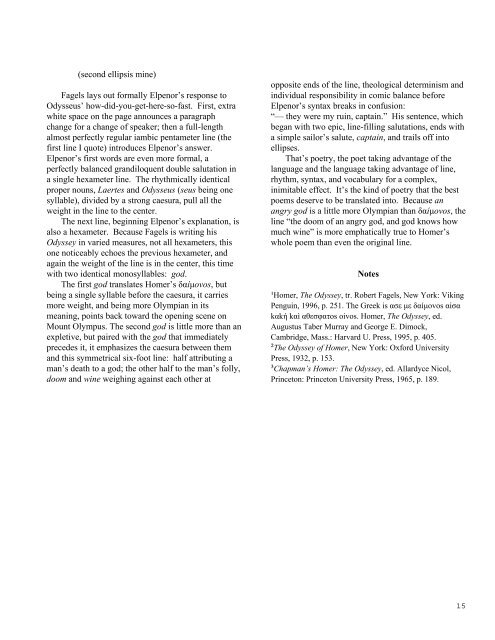their - The University of Texas at Dallas
their - The University of Texas at Dallas
their - The University of Texas at Dallas
Create successful ePaper yourself
Turn your PDF publications into a flip-book with our unique Google optimized e-Paper software.
(second ellipsis mine)<br />
Fagels lays out formally Elpenor’s response to<br />
Odysseus’ how-did-you-get-here-so-fast. First, extra<br />
white space on the page announces a paragraph<br />
change for a change <strong>of</strong> speaker; then a full-length<br />
almost perfectly regular iambic pentameter line (the<br />
first line I quote) introduces Elpenor’s answer.<br />
Elpenor’s first words are even more formal, a<br />
perfectly balanced grandiloquent double salut<strong>at</strong>ion in<br />
a single hexameter line. <strong>The</strong> rhythmically identical<br />
proper nouns, Laertes and Odysseus (seus being one<br />
syllable), divided by a strong caesura, pull all the<br />
weight in the line to the center.<br />
<strong>The</strong> next line, beginning Elpenor’s explan<strong>at</strong>ion, is<br />
also a hexameter. Because Fagels is writing his<br />
Odyssey in varied measures, not all hexameters, this<br />
one noticeably echoes the previous hexameter, and<br />
again the weight <strong>of</strong> the line is in the center, this time<br />
with two identical monosyllables: god.<br />
<strong>The</strong> first god transl<strong>at</strong>es Homer’s δαíμovos, but<br />
being a single syllable before the caesura, it carries<br />
more weight, and being more Olympian in its<br />
meaning, points back toward the opening scene on<br />
Mount Olympus. <strong>The</strong> second god is little more than an<br />
expletive, but paired with the god th<strong>at</strong> immedi<strong>at</strong>ely<br />
precedes it, it emphasizes the caesura between them<br />
and this symmetrical six-foot line: half <strong>at</strong>tributing a<br />
man’s de<strong>at</strong>h to a god; the other half to the man’s folly,<br />
doom and wine weighing against each other <strong>at</strong><br />
opposite ends <strong>of</strong> the line, theological determinism and<br />
individual responsibility in comic balance before<br />
Elpenor’s syntax breaks in confusion:<br />
“— they were my ruin, captain.” His sentence, which<br />
began with two epic, line-filling salut<strong>at</strong>ions, ends with<br />
a simple sailor’s salute, captain, and trails <strong>of</strong>f into<br />
ellipses.<br />
Th<strong>at</strong>’s poetry, the poet taking advantage <strong>of</strong> the<br />
language and the language taking advantage <strong>of</strong> line,<br />
rhythm, syntax, and vocabulary for a complex,<br />
inimitable effect. It’s the kind <strong>of</strong> poetry th<strong>at</strong> the best<br />
poems deserve to be transl<strong>at</strong>ed into. Because an<br />
angry god is a little more Olympian than δαíμovos, the<br />
line “the doom <strong>of</strong> an angry god, and god knows how<br />
much wine” is more emph<strong>at</strong>ically true to Homer’s<br />
whole poem than even the original line.<br />
Notes<br />
¹Homer, <strong>The</strong> Odyssey, tr. Robert Fagels, New York: Viking<br />
Penguin, 1996, p. 251. <strong>The</strong> Greek is ασε με δαíμovos αiσα<br />
kαkή kαì αθεσφατos oivos. Homer, <strong>The</strong> Odyssey, ed.<br />
Augustus Taber Murray and George E. Dimock,<br />
Cambridge, Mass.: Harvard U. Press, 1995, p. 405.<br />
²<strong>The</strong> Odyssey <strong>of</strong> Homer, New York: Oxford <strong>University</strong><br />
Press, 1932, p. 153.<br />
³Chapman’s Homer: <strong>The</strong> Odyssey, ed. Allardyce Nicol,<br />
Princeton: Princeton <strong>University</strong> Press, 1965, p. 189.<br />
15

















